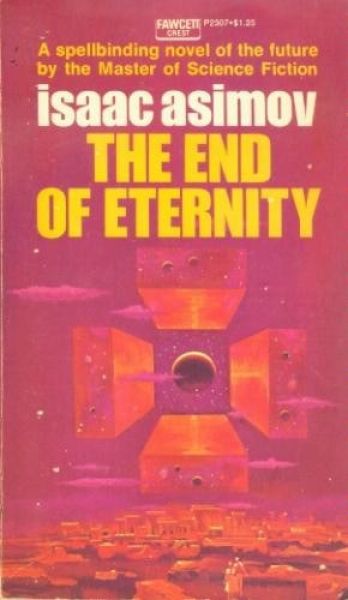Time Was Just A Clock To Me
The End of Eternity
By Isaac Asimov

12 Apr, 2020
Isaac Asimov’s 1955 The End of Eternity is a standalone1 time-travel thriller.
A secretive cabal of Eternals (recruited from the mundanes of various periods) guide human destiny. They monopolize time travel and monitor human societies over a span of 70,000 centuries. They steer societies away from extremes and disasters, towards sustainable optimums. Andrew Harlan is a loyal member of the cabal, known as Eternity.
Or rather, he was. Now he is working to destroy Eternity.
The Eternals stand outside time but can travel through it. Individually, they are unaffected by any changes they make; they can alter history with impunity, encouraging what they regard as beneficial developments while discouraging destructive trends. However, due to Eternity’s constant tinkering with history, no member of Eternity can ever return to their era of origin without finding it changed, potentially beyond recognition.
Andrew Harlan hails from a period of austerity and puritanism. He is well content to judge and reshape other beings. He is sufficiently monkish that Eternity’s policy of recruiting only males to full membership in the cabal is no burden. Has been no burden … until he meets a lower-ranked contact in an era he is reshaping. Noÿs Lambent is irresistible and Harlan falls for her, hard. A torrid affair follows.
The work on Noÿs’ era is deemed too flawed to retain. Minor modifications are decreed. To Harlan’s horror, he discovers that the alterations will remove Noÿs from history.
Harlan absconds with a willing Noÿs, hiding her far in the future, in a time after the extinction of humanity. When he tries to return to her, he finds that someone or something has blocked time travel to that time. Harlan suspects that this is the work of the cabal.
Harlan eventually discovers that he is fated to play a central role in the creation of Eternity. Or, should he so choose, a central role in punishing Eternity and sabotaging the stable causal loop that serves as its foundation.
~oOo~
This book was nominated for the Best Novel Hugo in 1956, along with Double Starby Robert A. Heinlein, Not This August by C. M. Kornbluth, The Long Tomorrow by Leigh Brackett, and Three to Conquer by Eric Frank Russell2. It lost to the Heinlein3.
Speaking of Foundations, The End of Eternity is almost a mirror image of the Foundation series: both feature secretive, all powerful cabals working to guide society toward a form that the cabal deems best. Foundation, whose initial installment was first published when the author was twenty-two, never questions whether the cabal has the right to shape history or the wisdom to choose the right ends. Eternity, which saw print when Asimov was a hopelessly ancient thirty-five, addresses such questions.
Asimov isn’t known for his generous treatment of female characters. At first one might regard The End of Eternity as more of the same. It spectacularly fails the Bechdel test: there’s only one woman who gets a significant number of lines: Noÿs. Her only role seems to be as a focus for Harlan’s obsession. She exists to motivate him, rather than having goals of her own. Or so it seems.
As it happens, Noÿs turns out to have goals of her own. This is a rare golden-age SF story in which a Boys Club organization4 is shown to be flawed. For one thing, Harlan can be easily manipulated by his own susceptibility to erotic lures. A well-shaped calf can deturn history.
Readers expecting Asimov’s usual attitude toward women characters will be pleasantly surprised by the ending. The plot probably couldn’t support a lengthy book, but this book is short and to the point. This isthe best of Asimov’s novels.
The End of Eternityis available here (Amazon US), here (Amazon Canada), here (Amazon UK), here (Book Depository), and here (Chapters-Indigo).
1: LAH LAH LAH I CAN’T HEAR YOU.
2: Three to Conquer, by Eric Frank Russell, is the only 1956 finalist I haven’t reviewed (adds a title to the TBR list).
3: I had initially confused the 1956 Best Novel Hugo with the 1955 Best Novel Hugo. Glad to have that straightened out! Losing to Double Star is much better than losing to They’d Rather Be Right, which is generally acknowledged to have been the worst novel ever to win a Hugo. No, I’ve not reviewed it, but you all know where the Commission a Review button is….
4: The reason Eternity is all male is hardly flattering to men. In this setting, there are said to be many men who can be removed from history without altering it in the slightest. The same is not true of women.
